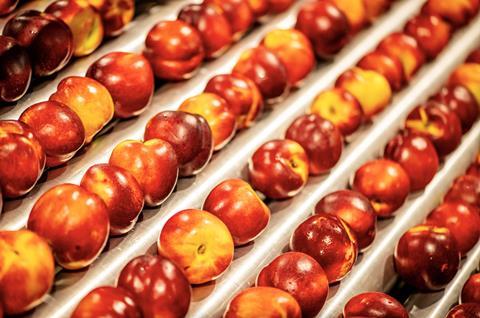New plantations come into play as the industry sees rising demand and improved grower returns
South African growers are increasing plantings of nectarines on the back of rising demand and better financial returns at grower level, although the industry is still under financial pressure.

Young nectarine orchards that were planted in the last few years are now coming into production, with new higher-yielding varieties further boosting volumes and the use of netting leading to higher packouts.
These developments occur during a period of improved profitability for South African growers, alongside increased demand for nectarines, both locally and on the international markets.
Figures from industry body Hortgro show that last season South Africa exported 3.4m 2.5kg cartons of nectarines to the UK, with early season estimates pointing to a 20 per cent increase in overall exports this season.
The area under nectarine production increased from 2,314ha to 2,776ha in 2022, representing a rise on the year before.
Mixed picture
The picture is a mixed one when it comes to other stonefruit crops, however, Hortgro outlined.
The plum sector has consolidated and experienced a slight decline in plantings as a result of the extremely poor financial returns received by growers over the past two years. Peach production and exports are stable, but with a longer-term declining trend.
Peach and plum export volumes are expected to be similar to last season’s figures, where 795,000 cartons of peaches and 2.4m cartons of plums were sent to the UK.
The South African nectarine and peach season runs from October to April, while the plum season runs from November to May, with the peak season for stonefruit overall around the end of January and beginning of February.
Hortgro reports promising prospects for the upcoming season across all commodities, except for apricots.
This is at the back of excellent winter rainfall and good conditions for stonefruit production, with the climate and abundant sunshine also bringing exceptional taste and colour.
“Planting of new cultivars is a very calculated process, in terms of timing, quality, consistency and continuity,” explained Jacques du Preez, general manager of trade and market at Hortgro. “We strive to supply consistently great-quality fruit over as long a period as possible, and local evaluation and adaptability trials are crucial in this process.”
Port challenges
South African fruit supplies have been affected by well-documented issues at ports, but Du Preez said the industry is working hard to find long-term solutions.
“Combined, all the fruit industries have put a tremendous amount of work, time and resources into turning around the situation in the state-run ports,” he outlined.
“Over the short term this will remain a challenge, but we are hopeful to have properly run ports in the next 6-18 months. We have no other option but to restore our reputation as a reliable, on-time supplier of fresh produce as soon as possible.
”There are initiatives underway from Transnet, the state-owned enterprise operating the ports, but it is crucial for the private sector to be allowed to get involved to expedite the process,” Du Preez added.
This season’s crop will be promoted in the UK via a consumer campaign featuring a wide range of in-store activity, social media and influencer collaboration, as well as recipes and a competition to win a holiday to South Africa. A trade-focused strand of the campaign focuses on restoring industry confidence in South Africa as a key primary source.



